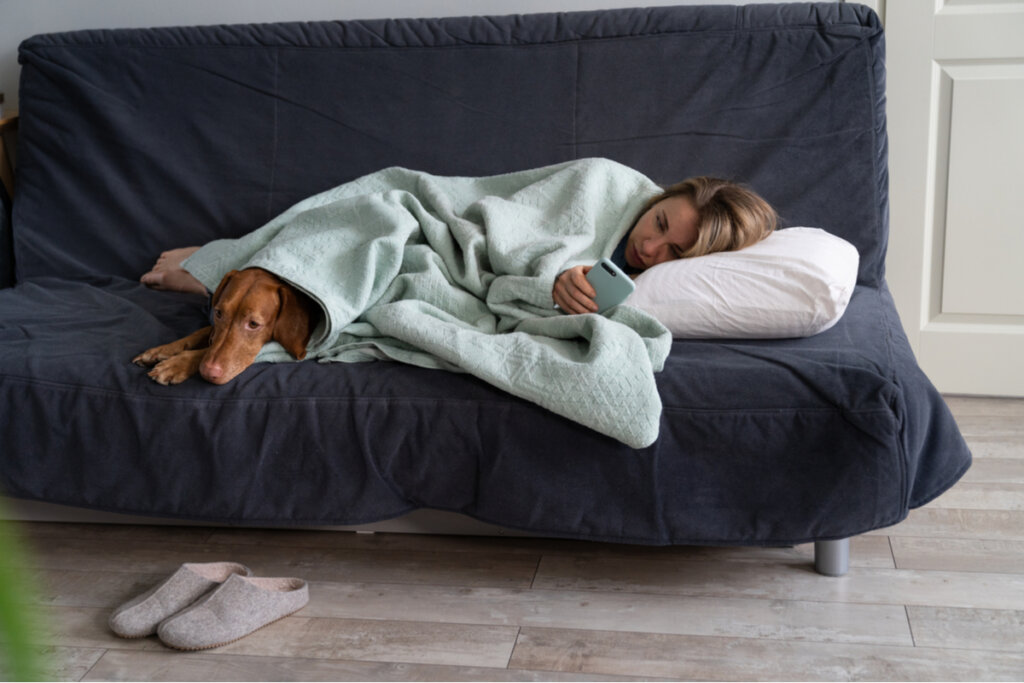Ten Tips to Help Unglue You from Your Cell Phone

Today, you and your cell phone tend to be inseparable. You go out with it, take it to work, and take it with you when you meet your friends. You even take it to bed with you. Indeed, it takes up a great deal of your time, including the time spent looking for it when you’ve misplaced it for the umpteenth time.
You’d probably be extremely surprised if you had a timer to tell you exactly how long you spend looking at your screen every day. In fact, if you feel like it may be becoming a bit of an issue for you, here are ten tips to help unglue you from your cell phone.
Consequences of cell phone addiction

There may be several reasons for you to want to unglue yourself from your cell phone for a while. Perhaps you have some projects to undertake and don’t want to be continually distracted. Or, maybe you simply don’t want to be contactable at all hours of the day and night.
In 2019, the Journal of Child and Family Studies published a study that linked excessive cell phone use with anxiety, depression, and stress. In fact, other researchers claim that cell phone addiction reduces the quality of sleep, so episodes of insomnia are common. There’s also evidence of physiological damage to the wrist from continued use.
This evidence points to the fact that there’s a real necessity to reduce cell phone use. Indeed, no dependency relationship is ever healthy, so, with this in mind, you’d be well advised to control the way in which you use your cell phone. You don’t need to completely remove it from your life. It’s just about controlling the amount of time you spend on it a day.
The best tips for unglueing yourself from your cell phone
If you’re questioning yourself about the amount of time you spend on your cell phone, you can check it yourself from the Settings section. In fact, most terminals include a section on digital well-being, where you can see the total number of unlocks, notifications received, and the time you’ve spent on each app.
After accessing this information, you’ll probably want to try some tricks to avoid your cell phone. Here are some helpful tips.
1. Disable push notifications
This is the first step you need to take to avoid using your cel phone. Push notifications act as invitations to start using the device, regardless of whether you’re busy with other matters when you see them.
Twitter, YouTube, Instagram, Facebook, WhatsApp, Telegram, Netflix…, we could list dozens of other apps that notify you about something new and make it irresistible for you to pick up and look at your cell phone. Fortunately, you can put a stop to this torrent of information by simply turning off notifications. However, if you wish, keep one or two apps that you consider to be the most important activated.
This action may not seem like such a big change, but after a couple of weeks, you’ll find that it helps you release your anxiety and tension. Furthermore, you’ll be spending less time looking at the screen.
2. Clear your home screen of apps
The home screen is the first contact you have with your cell phone. You usually organize it based on the apps you use most frequently. You take the phone, unlock it, and then, with one touch, you can access the app you want.
However, what would happen if you emptied the home screen of all the apps? As a matter of fact, you’d still be able to access them from the settings menu, only they wouldn’t be so readily available to you. While it’s a simple step, it can have a significant impact.
Imagine that you always have a jar of candies on the table. Undoubtedly, every time you go by, you won’t be able to resist the temptation to take one. Now, imagine that you hide the jar in the upper part of the cupboard. You can still reach it, only it’s no longer right in front of you.
3. Remove apps that waste your time
Once you’ve worked out which apps you use the most, the most logical step is to delete them. Don’t panic, remember that you can always download them again from the App Store or Google Play. Furthermore, most of them you can also use directly from the browser.
YouTube, Twitter, Facebook, Instagram, and Spotify, among others, are all available from their online version. These interfaces are a little less intuitive, their functions are limited, and it takes a little longer to load. However, these obstacles will help you feel less inclined to use them as the days go by.
After a couple of weeks, you can reduce your usage even more. Try having one day on and one day off. Then, increase the off days, based on how comfortable you feel. Remember that no app is essential unless they form a part of your work.
4. Download helpful apps
This might sound paradoxical, downloading apps to stop using apps. However, the truth is that they really work. They operate by controlling the time you spend with your cell phone activated. Some of the best you can use include the following:
- Forest (Android and iOS).
- Screentime (Android and iOS).
- QualityTime (Android).
- Flipd (Android and iOS).
- Your Hour (Android).
This is just a small selection of these kinds of apps. However, in your store, you’ll find dozens and dozens with similar functions. They allow you to do many things: from blocking access to an app for a certain time, to disconnecting your cell phone completely from the network and showing you your total usage time at the end of each day.
Some also include a feature that rewards you for the time you’ve stayed disconnected. This is certainly the case with Forest, which is undoubtedly the best app on the list. Your reward consists of growing a plant and then a garden when you reduce the time you spend glued to your screen.
5. Avoid using your cell phone 30 minutes before sleeping

Since most of the day you’ll be working or studying, it’s likely that the bulk of the use you make of your cell phone will be in the evening. To nip dependency in the bud, the best thing you can do is to avoid picking it up 30 minutes before you go to bed.
To do this, you must put several things into practice. The first is to avoid charging it inside the bedroom since it’s almost inevitable that you’ll pick it up once it’s been charged. The second is to avoid leaving it in an easily accessible area, like your bedside table.
6. Learn to use airplane mode
The airplane mode is fantastic. It’s a function that allows you to disconnect from everything, without leaving the equipment inoperative. In fact, you can access almost all the tools, as long as they don’t require a connection.
Why’s it so useful? Well, it’s because you can have your cell phone near you, in your pocket or close to your desk, so you’ll know where it is, but you won’t be distracted by any incoming notifications.
7. Buy a wristwatch
You probably didn’t expect to see this tip on the list. However, it’s an extremely practical piece of advice that helps eliminate the automatic urge to unlock your screen. Think about the following: how many times have you unlocked your screen just to see the time? Nevertheless, you end up not even noticing it.
This is something that’s happened to all of us. In fact, you probably panic when you realize that you haven’t actually even seen the time, despite picking up your cell phone with this intention in mind.
This is mainly due to the fact that your intention wasn’t really to see the time, but rather to unlock the screen to see if you had any messages. Sometimes, you do it just to press the button, following an automatic impulse. However, if you buy a wristwatch, you’ll no longer have the excuse.
8. Avoid taking it with you
Is this really possible? Well, of course, it is. Indeed, until a few decades ago nobody even had a cell phone to take out with them. However, nowadays, our dependence on the cell phone means we even use it in the bathroom or when we’re walking down the street. The latter has even earned it its own nickname: zombie walking.
Try leaving the house without it. Leave it in another room. Nothing bad will happen. For example, you can certainly dispense with its use when you go to the hairdresser, to buy a sandwich around the corner, play sports, or when you take your dog for a walk.
You may well ask yourself, what happens if something happens and I’ve left my cell phone at home? Well, just answer this question. How many extraordinary things have actually happened to you when you’ve gone to the hairdresser? Therefore, start to incorporate this habit gradually into your routine. However, only in the type of activities when you feel most comfortable being without it.
9. Replace some of the things you can do with it
We’ve already mentioned one: buy a watch. Nevertheless, the cell phone has also replaced hundreds of other tools. In part, this is why you’re so dependent upon it. Some of the tools you can use to avoid unlocking your screen are a calendar and a calculator.
We’re not joking here. Because sometimes, admit it, you use the excuse of doing a calculation on your cell phone and actually end up checking the latest news on Twitter for 20 minutes. By replacing these kinds of tools, you’ll understand that there are things you can do without your cell phone. It’s not a device you can’t live without, and its pathological use can always be controlled if you set your mind to it.
10. It’s okay if from time to time you decide to turn it off
Finally, you can simply turn your cell phone off. This is a temporary decision. Nevertheless, it probably feels pretty final, as you’re cutting the loop that motivates you to check the screen.
Give it a try. During your workday, while you sleep, when you’re taking a bath, playing sports, or when you’re just at home, but want a break from technology. You only need to touch a button to allocate four hours of your time on TikTok. In the same way, you only need to not touch the button in order to do something else instead.
Finally, we just want to say that with this selection of tips, our intention hasn’t been to stigmatize the use of technology in any way. In fact, in most cases, our lives are better thanks to it. However, we just need to learn to exercise a bit of balance so it doesn’t totally disrupt our routines. At the end of the day, we all need space from time to time to give our brains a well-needed rest.
All cited sources were thoroughly reviewed by our team to ensure their quality, reliability, currency, and validity. The bibliography of this article was considered reliable and of academic or scientific accuracy.
- Liu, Q. Q., Zhou, Z. K., Yang, X. J., Kong, F. C., Niu, G. F., & Fan, C. Y. (2017). Mobile phone addiction and sleep quality among Chinese adolescents: A moderated mediation model. Computers in Human Behavior. 2017; 72: 108-114.
- Parasuraman S, Sam AT, Yee SWK, Chuon BLC, Ren LY. Smartphone usage and increased risk of mobile phone addiction: A concurrent study. Int J Pharm Investig. 2017 Jul-Sep;7(3):125-131.
- Yang, X., Zhou, Z., Liu, Q., & Fan, C. Mobile phone addiction and adolescents’ anxiety and depression: The moderating role of mindfulness. Journal of child and family studies. 2019; 28(3): 822-830.
This text is provided for informational purposes only and does not replace consultation with a professional. If in doubt, consult your specialist.








